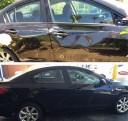Scary Stat: 25% of All Recalled Cars Never Get Fixed
Scary Stat: 25% of All Recalled Cars Never Get Fixed
If you’ve ever owned a car that was recalled for whatever reason, you know the drill. You get a notice in the mail from the manufacturer of your vehicle and then you contact the dealership to bring it in and get it fixed. Some recalls concern minor items, but others are about more serious factors, such as safety. This useful information is brought to you by Center Valley Automotive , one of the finest body shops in the state of CA .
Whenever an automaker issues a recall, they are required to notify owners of potentially affected vehicles, but despite those efforts, studies reveals that 25% of recalled cars are never fixed because owners mistake recall notifications for junk mail. It’s amazing to learn how many people don’t follow through when their vehicles are summoned for recalls, because in many cases, these recalls can involve vital parts such as brakes, ignition switches and even navigation systems.
There are 36 million cars out on the road right now that failed to respond to a recall and that is a very dangerous statistic. You may be driving right next to a vehicle that contains faulty equipment and not even know it. Indeed, you may be driving in a recalled vehicle yourself!
It’s a problem that compounds itself year after year. The National Highway Traffic Safety Administration (NHTSA) did a study revealing that the average recall completion rate in the U.S. is about 75% annually, though the rate for older vehicles is much lower.
Several thousand older GM vehicles have had their faulty ignition switches fixed, but the carmaker is vying for a 100% completion rate. Millions of cars including older Chevrolet Cobalt’s, Pontiac G5s, and Saturn Ion models are included in the high-profile ignition switch recall, and GM says more than 154,000 ignition switches have been replaced at this point.
As for those that go unfixed, experts claim that there are several reasons why recalls go unaddressed: Cars are sold, owners move, or they simply ignore notices or don’t take time for repairs. To help spread the word, automakers have started making more phone calls, sending follow-up postcards, and alerting the public through social media, but still many people say they don’t get the news.
Federal regulators normally require automakers to notify customers within 60 days of when a recall is issued, even if no fix is available. After a fix becomes available, a second letter is then sent. The mail is normally designed in such a way that it doesn’t look like junk mail, with large letters prominently displayed on the front of the envelope that says “Your Car is Being Recalled” or something to that effect.
In an effort to prevent owners of affected vehicles from tossing those important recall notices in the trash, the NHTSA adopted a new label that will help better identify them. The new labels stand out with "Important Safety Recall Information" appearing in all caps highlighted in red so that owners can easily distinguish the recall notice from other types of mail.
The NHTSA and U.S. Department of Transportation logos will also be visible, as well as the words "Issued in Accordance with Federal Law." The NHTSA also launched an app called Safer Car that allows users to access recall and safety performance information.
So, the next time you get a piece of mail (or even a phone call) that informs you of an upcoming recall for your vehicle, please respond quickly and definitively, so that you can drive safely and with that much-needed peace of mind. Hopefully this information, provided by Center Valley Automotive, will help you if and when your car is recalled.
Sources: NHTSA, Car News and GM











Social